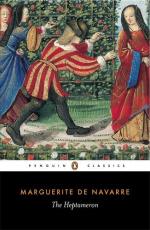The letters of remission which at the instance of Henry VIII. were granted to Michael de St. Aignan in respect of the murder of James du Mesnil are preserved in the National Archives of France (Register J. 234, No. 191), and after the usual preamble, recite the culprit’s petition in these terms:—
“Whereas it appears from the prayer of Michael de St. Aignan, lord of the said place, (1) that heretofore he for a long time lived and resided in the town of Alencon in honour and good repute; but, to the detriment of his prosperity, life, and conduct there were divers evil-minded and envious persons who by sinister, cunning, and hidden means persecuted him with all the evils, wiles, and deceits that it is possible to conceive, albeit the said suppliant had never caused them displeasure, injury, or detriment; among others, one named James Dumesnil, a young man, to whom the said suppliant had procured all the pleasure and advantages that were in his power, and whom he had customarily admitted to his house, thinking that the said Dumesnil was his loyal friend, and charging his wife and his servants to treat him when he came as though he were his brother; by which means St. Aignan hoped to induce the said Dumesnil to espouse one of his relatives.
1 This was in all probability the village of St. Aignan on the Sarthe, between Moulins-la-Marche and Bazoches, and about twenty miles from Alencon. The personage here mentioned should not be confounded with Emery de Beauvilliers, whom Francis I. created Count of St. Aignan (on the Cher), and whose descendants, many of whom were distinguished generals and diplomatists, became dukes of the same place.—Ed.
“But Dumesnil ill-requited the aforesaid good services and courtesies, and rendering evil for good, as is the practice of iniquity, endeavoured to and did cause an estrangement between the said St. Aignan and his wife, who had always lived together in good, great, and perfect affection. And the better to effect his purpose he (Dumesnil) gave the said wife to understand, among other things, that St. Aignan bore her no affection; that he daily desired her death; that she was mistaken in trusting him; and other evil things not fitting to be repeated, which the wife withstood, enjoining Dumesnil not to use such language again, as should he do so she would repeat it to her husband; but Dumesnil, persevering, on divers occasions when St. Aignan had absented himself, gave the wife of the latter to understand that he (St. Aignan) was dead, devising proofs thereof and conjectures, and thinking that by this means he would win her favour and countenance. But she still resisted him, which seeing, the said Dumesnil gave her to understand that St. Aignan would often absent himself, and that she would be happier if she had a husband who remained with her. And plotting to compass the death of the said St. Aignan, Dumesnil gave her to understand that if she would consent to the death of her husband




